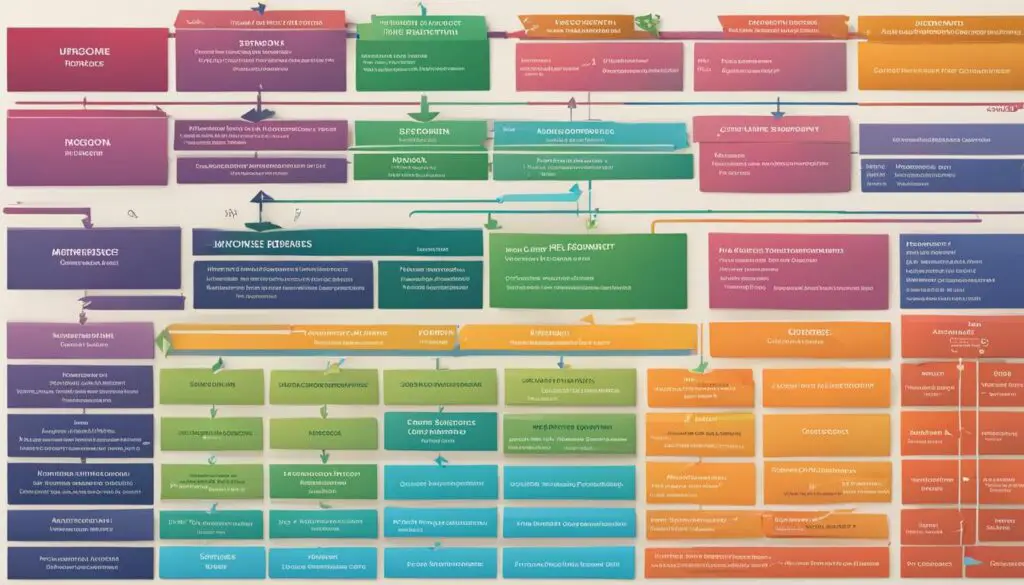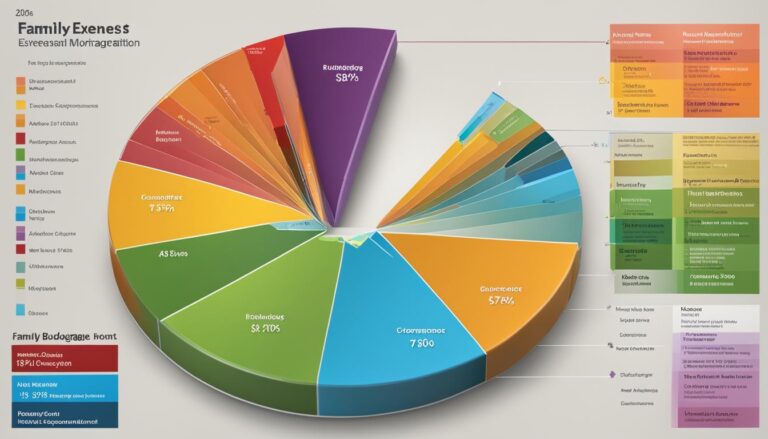Navigating Family Finances: Smart Tips and Tricks
Managing family finances can sometimes feel like a daunting task. From everyday expenses to unexpected bills and long-term savings goals, it’s important to have effective money management strategies in place. By implementing these strategies, you can reduce stress, create financial security, and pave the way for a brighter future for your family.
One essential aspect of successful money management is open communication within the family. Honest conversations about finances help reduce conflict and involve everyone in the planning and budgeting process. It’s a great way to teach children about money and foster shared savings goals.
Creating a family budget is a key component of managing money wisely. A budget allows you to prioritize needs, save for wants and the future, and be prepared for unforeseen expenses. Start by assessing your income, expenses, and debts. Then, craft a plan to spend less than you earn and allocate funds towards savings and desired purchases. Budget planners and savings calculators can be useful tools for tracking expenses and achieving your financial goals.
To make budgeting more effective, involve the whole family in the process. Encourage open discussions and let everyone contribute their ideas. Consider setting deadlines for financial goals and exploring different savings options, such as high-interest bank accounts or investments, to maximize your savings and financial growth.
Key Takeaways:
- Open communication within the family is crucial for successful money management.
- Creating a family budget helps prioritize needs, save for wants, and be prepared for unforeseen expenses.
- Assessing income, expenses, and debts is the first step in effective budgeting.
- Involving the whole family in the budgeting process fosters shared responsibility and financial awareness.
- Setting savings goals and exploring different savings options can enhance your financial planning.
The Importance of Money Management
Money management plays a pivotal role in families’ financial well-being, providing them with a sense of control, reducing stress, and ensuring long-term financial security. By effectively managing their finances, families can enjoy their lives without constant worry about money matters.
Honest and open communication within the family about money is essential for successful money management. It fosters a supportive environment and reduces conflicts related to financial decisions. Engaging in conversations about money allows families to set shared savings goals and work together towards achieving them.
Involving children in the planning and budgeting process is also crucial. By including them, families can instill smart money habits from a young age, empowering the next generation with financial literacy and responsibility.
“Money management is not just about numbers; it’s about cultivating healthy financial habits and attitudes within the family.”
Reduce Stress and Achieve Financial Security
Effective money management significantly reduces stress levels within families. When finances are managed well, there is a greater sense of control over expenses, creating peace of mind and reducing anxiety about meeting financial obligations.
Furthermore, proper money management provides families with a foundation of financial security. By implementing strategies such as budgeting, saving, and investing, families can build a financial cushion to handle emergencies, unexpected expenses, and secure their future. Financial security brings a sense of stability and the confidence to navigate the ups and downs of life.
Instilling Smart Money Habits
Instilling smart money habits in children is a crucial aspect of money management within families. By involving them in financial discussions and decision-making, children learn the value of money, the importance of budgeting, and the benefits of long-term financial planning.
When children witness responsible financial behavior and actively participate in money management, they develop essential skills and attitudes that will serve them well into adulthood. Teaching children about money early on sets them up for a lifetime of informed financial choices and paves the way for their own financial security.
| Benefits of Money Management | |
|---|---|
| Reduces stress | Provides a sense of control over finances |
| Ensures financial security | Builds a foundation to handle emergencies and unexpected expenses |
| Instills smart money habits in children | Teaches the value of money, budgeting, and long-term planning |
In the next section, we will delve into the process of creating a family budget, a fundamental tool for effective money management.
Creating a Family Budget
A family budget is a fundamental tool for managing money effectively and achieving financial goals. By creating a budget, families can prioritize their needs, save for wants and the future, and be prepared for unforeseen expenses. Let’s explore how to create a comprehensive family budget that promotes financial stability and reduces financial stress.
Assessing Income, Expenses, and Debts
The first step in creating a family budget is to assess your income, expenses, and debts. Take a thorough look at your salary statements, bills, and bank statements to understand your cash flow. This analysis will help you identify your spending habits, areas where you can cut costs, and determine how much you can allocate for savings and desired purchases.
| Income | Expenses | Debts |
|---|---|---|
| Salary | Rent/Mortgage | Credit Card |
| Investments | Utilities | Student Loans |
| Side Hustles | Groceries | Car Loan |
Once you have a clear understanding of your income, expenses, and debts, it becomes easier to formulate an effective budget plan.
Allocating Funds and Prioritizing Needs
With your comprehensive financial overview, you can now allocate funds and prioritize your needs within your budget. Start by setting aside money for essential expenses such as housing, utilities, groceries, transportation, and healthcare. These are considered your basic needs and should be given top priority in your budget.
Quote: “A budget is telling your money where to go instead of wondering where it went.” – Dave Ramsey
Once you have allocated funds for your needs, you can then designate a portion of your budget for savings. It’s important to establish an emergency fund to cover unforeseen expenses, like medical emergencies or sudden car repairs. Having this financial safety net provides peace of mind and prevents the need to rely on credit or loans in times of crisis.
After fulfilling your needs and savings, you can allocate a portion of your budget for wants and desired purchases. Whether it’s a family vacation or a new gadget, saving up for wants allows you to enjoy life’s pleasures without jeopardizing your financial stability.
Using Budget Planners and Savings Calculators
Utilizing budget planners and savings calculators are invaluable tools for effective financial management. Budget planners help you track your income and expenses, allowing you to analyze your spending patterns and identify areas where you can reduce costs. By monitoring your budget regularly, you can make necessary adjustments to stay on track with your financial goals.
Savings calculators, on the other hand, help you determine how much to save monthly or annually to reach specific financial milestones. You can calculate the amount you need to set aside for your children’s education, home down payment, or retirement, ensuring that your goals are realistic and attainable.
Involving the Whole Family in the Budgeting Process
Creating a family budget should be a collaborative effort. Involving the entire family in the budgeting process fosters shared responsibility and open discussions about financial priorities. This is a great opportunity to teach children about money management and instill smart financial habits from an early age.
When discussing the budget with your family, emphasize the importance of prioritizing needs, saving for wants and the future, and being prepared for unforeseen expenses. Encourage everyone’s input and ideas to ensure that all voices are heard and respected.
“The only way you will ever permanently take control of your financial life is to dig deep and fix the root problem.” – Suze Orman
By involving the whole family in the budgeting process, you create a strong foundation for financial stability and long-term success.
Getting Started with Budgeting
The key to successful budgeting is to spend less than you earn. It all starts with assessing your income and expenses. Take a close look at your past salary statements, bills, and bank statements to gain a clear understanding of your financial situation. This assessment will help you identify your spending habits and pinpoint areas where adjustments can be made.
Begin by considering all sources of income, including your salary, any secondary jobs or freelance work, and any passive income you may receive. It’s important to include all the money coming in so you have an accurate picture of your financial resources.
Next, assess your expenses. Dive deep into your bills, both fixed and variable, to determine your regular outflow of cash. Consider your housing costs, utilities, transportation expenses, groceries, and any subscriptions or memberships you have. Make sure to also account for occasional expenses like medical bills or car repairs. By listing all your expenses, you’ll gain a comprehensive view of where your money goes.

Once you’ve assessed your income and expenses, you can start creating a budget that aligns with your financial goals. A budget allows you to allocate your funds wisely, ensuring you have enough money for essentials, emergencies, savings, and desired purchases.
Consider categorizing your expenses into fixed and variable categories. Fixed expenses are those that stay consistent month-to-month, such as rent or mortgage payments, while variable expenses fluctuate. This breakdown allows you to see where you have more control over spending and where you may need to make adjustments.
To help you get started, here’s a step-by-step guide to budgeting:
- Assess your income and expenses, as discussed earlier.
- Identify areas where you can cut back on unnecessary expenses. For example, you may find that you’re spending too much on dining out or entertainment. By reducing these expenses, you can free up more money for savings or paying off debts.
- Create your budget by allocating your income to different categories. Make sure to prioritize essential expenses like housing, utilities, and groceries. Set aside a portion for savings and desired purchases.
- Track your spending regularly to ensure you’re staying within your budget. Consider using budgeting apps or spreadsheets to help you monitor your expenses and make adjustments as needed.
A well-planned budget can provide financial stability and peace of mind. It allows you to take control of your money and make informed decisions about your spending habits.
Remember: Spending less than you earn is the foundation of effective budgeting. Assessing your income and expenses is the first step towards achieving financial success.
Planning for Savings
When it comes to managing money effectively, planning for savings is a crucial step. By carefully reviewing your spending habits, you can identify areas where you can cut back and save more. This might involve reducing expenses on certain items, paying off debts, or exploring alternative credit or loan options. Building a savings buffer for emergencies is equally important, as it provides a safety net for unexpected financial challenges.
But setting savings goals for the future is the cornerstone of a solid financial plan. By defining specific objectives, you can stay focused and motivated in your savings journey.
One helpful strategy to facilitate consistent saving is to open fee-free bank accounts and set up automatic transfers. This ensures that a portion of your income is automatically set aside for savings each month, reducing the temptation to spend it elsewhere.
“A savings plan is a roadmap to financial success. By setting clear goals and mapping out your path, you can make smart financial decisions and achieve your dreams.”
It’s also worth considering seeking advice from a financial advisor who can provide guidance tailored to your specific circumstances. They can help you explore different investment options and structures that align with your long-term goals, maximizing your savings potential.
Remember, planning for savings is an ongoing process. Regularly assess your progress, make adjustments as needed, and stay committed to your financial objectives. By taking these steps, you’ll be well on your way to achieving financial security and enjoying the benefits of your hard-earned savings.
The Benefits of Planning for Savings
There are several compelling reasons why planning for savings is crucial for your financial well-being:
- You have a clear direction and purpose for your savings, enabling you to stay focused on your goals.
- Regularly reviewing your spending habits helps you identify potential areas for improvement, ensuring that you are making the most of your income.
- Building a savings buffer provides peace of mind and financial security, allowing you to handle unexpected expenses without disrupting your long-term plans.
- Automating your savings makes it easier to save consistently, eliminating the need for constant manual transfers and minimizing the risk of overspending.
- Seeking advice from a financial advisor ensures that you are making informed decisions and maximizing the growth potential of your savings.

Savings Goals
| Savings Goal | Target Amount | Timeframe |
|---|---|---|
| Emergency Fund | $10,000 | 1 year |
| Vacation | $5,000 | 2 years |
| Down Payment for a Home | $50,000 | 5 years |
| Children’s Education Fund | $100,000 | 10 years |
| Retirement | $1,000,000 | 30 years |
Tips for Meaningful Money Conversations
Having meaningful money conversations within the family is essential for successful financial management. These discussions can help foster understanding, alignment, and shared goals. To make your money conversations effective and productive, consider the following tips:
- Prepare Talking Points: Before initiating a money conversation, take the time to prepare talking points and set a clear agenda. This will help ensure that you cover all the important topics and stay focused.
- Use Visual Aids: Visual aids can be powerful tools to simplify complex financial topics and engage all family members. Consider using bank statements, budgeting apps, or interactive charts to visually represent your financial situation and goals.
- Create a Safe Space: Make sure that everyone feels comfortable and safe during money conversations. Create an open and judgment-free environment where family members can express their thoughts, concerns, and ideas freely.
- Avoid Lecturing or Negative Tone: Instead of lecturing or criticizing, approach money conversations with empathy, understanding, and a positive attitude. Encourage open dialogue and active listening to ensure that everyone’s perspective is heard and respected.
- Break Down Topics: Complex financial matters can be overwhelming, especially for children or family members with limited financial knowledge. Break down topics into manageable discussions and explain concepts in simple, relatable terms.
- Set Action Items: To keep the momentum going, set action items and follow-up steps after each money conversation. This will help ensure ongoing communication and joint decision-making in financial matters.
Remember, meaningful money conversations can empower your family to make informed financial decisions, build a strong financial foundation, and achieve your shared goals. So, start the conversation today!
Talking Points for Money Conversations
“Let’s discuss our short-term and long-term financial goals and how we can work together to achieve them.”
– The Smith Family
Conclusion
Navigating family finances requires effective financial management strategies and open communication within the family. Creating a family budget is a key tool for managing money wisely and achieving financial goals. By involving all family members in the budgeting process and teaching kids about money from a young age, families can set a solid foundation for smart money habits.
It is important to prioritize needs, save for wants and the future, and be prepared for unforeseen expenses. Reviewing expenses regularly, setting savings targets, and exploring different savings options can further enhance financial planning. By making deliberate choices and implementing strategies for saving money, families can strengthen their financial security and improve their overall well-being.
Furthermore, meaningful money conversations within the family play a vital role in financial planning. By using visual aids, such as bank statements or budgeting apps, families can simplify complex financial topics and engage all family members. Creating a safe space for open discussions, avoiding negative tones, and breaking down topics into manageable discussions can ensure ongoing communication and joint decision-making in financial matters.
In summary, family financial planning is essential for long-term financial security. Teaching kids about money and involving them in financial discussions instills smart money habits from a young age. Implementing strategies for saving money, such as creating a family budget, reviewing expenses, and setting savings goals, can help families achieve their financial aspirations. With effective communication and sound financial management, families can create a thriving environment that promotes financial well-being and sets a solid foundation for their future.
FAQ
What is the importance of money management?
Money management is crucial for meeting daily expenses, handling unexpected bills, and saving for the future. It reduces stress and creates financial security for your family.
Why is creating a family budget important?
Creating a family budget helps prioritize needs, save for wants and the future, and be prepared for unforeseen expenses. It allows you to manage your money effectively and achieve your financial goals.
How do I get started with budgeting?
To start budgeting, assess your income, expenses, and debts. Spend less than you earn and allocate funds for savings and desired purchases. Use budget planners and savings calculators to track expenses and achieve your financial goals.
How can I plan for savings?
Review your spending habits and identify areas where you can save more. Set specific savings goals, build a savings buffer for emergencies, and consider different savings options such as high-interest bank accounts or investments to maximize your savings.
How can I have meaningful money conversations with my family?
Prepare talking points, use visual aids like bank statements or budgeting apps, and create a safe space for open discussions. Break down topics into manageable discussions, set action items for future meetings, and involve all family members in decision-making.






